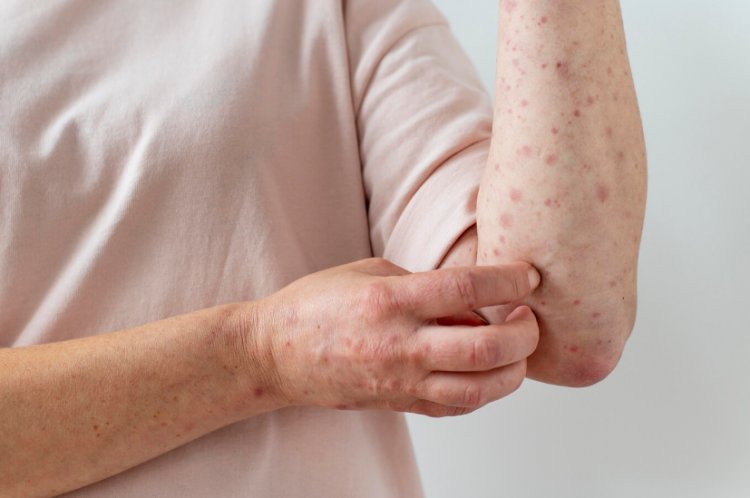Exploring Measles: Understanding Its Origin, Transmission, Clinical Manifestations, Complications, Diagnosis, Treatment, and Prevention
Measles, a highly contagious viral infection caused by the measles virus, has been a persistent threat to public health for centuries. Despite significant advancements in vaccination programs, measles outbreaks continue to occur worldwide, especially in communities with low vaccination rates. This comprehensive exploration delves into the intricate details of measles, encompassing its etiology, transmission dynamics, clinical manifestations, potential complications, diagnostic modalities, therapeutic approaches, and preventive strategies. #PreventiveStrategies #Vaccination #HerdImmunity #InfectionControl #PublicHealthSurveillance #Measles #UnitedKingdom #NHS #LondonSchoolofHygiene #GreatOrmondStreetHospital #PublicHealthEngland #MeaslesInitiative #Turkey #TurkishMinistryofHealth #HacettepeUniversity #IstanbulUniversity #AcibademHealthcareGroup #KoçUniversityHospital

Etiology
The measles virus belongs to the family Paramyxoviridae and genus Morbillivirus. It is a single-stranded RNA virus with a lipid envelope, which confers its susceptibility to environmental factors and disinfectants. The virus primarily targets the respiratory epithelium, lymphoid tissues, and endothelial cells, leading to systemic dissemination and a myriad of clinical manifestations.
Transmission Dynamics
Measles spreads through respiratory droplets expelled during coughing, sneezing, or talking by infected individuals. The virus can remain airborne for prolonged periods, facilitating its transmission over considerable distances. Additionally, fomite transmission occurs when virus-contaminated droplets settle on surfaces, remaining infectious for hours. Susceptible individuals become infected upon inhalation of aerosolized droplets or direct contact with contaminated surfaces, highlighting the importance of airborne precautions in disease containment.
Clinical Manifestations
The incubation period of measles ranges from 7 to 21 days, with an average of 10 to 14 days. The disease manifests in three distinct stages:
Prodromal Stage: Characterized by nonspecific symptoms resembling a respiratory tract infection, including fever, malaise, anorexia, cough, coryza, and conjunctivitis. The hallmark sign, Koplik's spots, manifests as small white lesions on the buccal mucosa, preceding the onset of the rash.
Exanthematous Stage: The onset of a generalized maculopapular rash marks the exanthematous stage. The rash typically begins on the face and neck, gradually spreading cephalocaudally to involve the trunk and extremities. Accompanying symptoms include high fever, which may exceed 40°C (104°F), and lymphadenopathy.
Convalescent Stage: Following resolution of the rash, patients enter the convalescent stage characterized by gradual recovery, with a gradual decline in fever and improvement in other symptoms.
Potential Complications
Measles can lead to a spectrum of complications, particularly in vulnerable populations such as infants, pregnant women, and immunocompromised individuals:
- Pneumonia: Measles-associated pneumonia, often bacterial superinfection, represents a significant cause of morbidity and mortality, especially in malnourished children.
- Encephalitis: Although rare, measles encephalitis can result in permanent neurological sequelae or death. It typically manifests 1 to 3 weeks after the rash onset and presents with altered mental status, seizures, and focal neurological deficits.
- Otologic Complications: Measles-associated otitis media, characterized by middle ear effusion and conductive hearing loss, may lead to long-term sequelae, including permanent hearing impairment.
- Miscarriage and Preterm Birth: Pregnant women infected with measles are at increased risk of adverse pregnancy outcomes, including spontaneous abortion, preterm labor, and low birth weight.
Diagnostic Modalities
Clinical diagnosis of measles relies on a combination of characteristic symptoms and epidemiological risk factors. Laboratory confirmation is essential, particularly in atypical cases or outbreaks, and encompasses serological testing, viral isolation from respiratory specimens, or molecular techniques such as polymerase chain reaction (PCR).
Therapeutic Approaches
No specific antiviral therapy exists for measles, emphasizing supportive care to alleviate symptoms and prevent complications:
- Fluid and Electrolyte Management: Adequate hydration is essential, especially in patients with high fever and poor oral intake, to prevent dehydration and electrolyte imbalances.
- Antipyretics: Nonsteroidal anti-inflammatory drugs (NSAIDs) or antipyretics such as acetaminophen help alleviate fever and discomfort.
- Respiratory Support: Patients with severe respiratory distress or pneumonia may require supplemental oxygen or mechanical ventilation.
Preventive Strategies
Vaccination remains the cornerstone of measles prevention, with the measles, mumps, and rubella (MMR) vaccine demonstrating high efficacy and safety. Two doses of MMR vaccine administered according to the recommended schedule confer long-term immunity in the vast majority of recipients. Additional preventive measures include:
Preventive Strategies
Vaccination:
Vaccination remains the cornerstone of measles prevention, with the measles, mumps, and rubella (MMR) vaccine demonstrating high efficacy and safety. Two doses of MMR vaccine administered according to the recommended schedule confer long-term immunity in the vast majority of recipients.
Additional Preventive Measures:
-
Herd Immunity: Achieving high vaccination coverage within communities creates a protective barrier, reducing the likelihood of disease transmission and safeguarding vulnerable individuals.
-
Infection Control Measures: Implementing strict infection control protocols, including isolation of suspected cases, respiratory precautions, and environmental disinfection, minimizes the risk of nosocomial transmission.
-
Public Health Surveillance: Timely identification, investigation, and containment of measles outbreaks are pivotal in preventing widespread transmission and mitigating the impact on public health.
Conclusion
Measles remains a formidable global health challenge, necessitating a multifaceted approach encompassing vaccination, vigilant surveillance, and prompt outbreak response. By fostering a comprehensive understanding of measles pathogenesis, clinical features, diagnostic modalities, therapeutic interventions, and preventive strategies, healthcare providers and policymakers can collaborate synergistically to curtail the burden of measles and safeguard population health.
Centers or Clinics in the United Kingdom:
NHS Immunisation Centre (England):
The National Health Service (NHS) in England operates immunization centers across the country, offering measles vaccinations as part of the routine childhood immunization schedule. These centers provide vaccinations and information on measles prevention.
London School of Hygiene & Tropical Medicine:
This renowned institution conducts research on infectious diseases, including measles, and offers expertise in epidemiology, vaccination strategies, and outbreak response. They also provide training programs and resources for healthcare professionals and public health practitioners.
Great Ormond Street Hospital for Children (GOSH):
GOSH, located in London, is a leading pediatric hospital with expertise in managing infectious diseases, including measles. They offer specialized care for children with measles, including diagnosis, treatment, and support for complications.
Public Health England (PHE):
PHE is the government agency responsible for protecting and improving public health in England. They provide guidance and resources on measles surveillance, outbreak investigation, and vaccination policy, working closely with healthcare providers and local authorities to control the spread of measles.
The Measles Initiative (Charity):
This charitable organization focuses on raising awareness about measles, advocating for vaccination programs, and supporting research to improve measles control and elimination efforts. They collaborate with healthcare providers, community organizations, and government agencies to address measles-related challenges.
Centers or Clinics in Turkey:
Turkish Ministry of Health (Sağlık Bakanlığı):
The Turkish Ministry of Health oversees public health initiatives, including vaccination programs for measles. They provide information on vaccination schedules, vaccine safety, and measles outbreak response strategies through their website and local health departments.
Hacettepe University Faculty of Medicine (Ankara):
Hacettepe University's Faculty of Medicine is a leading medical institution in Turkey with expertise in infectious diseases, epidemiology, and vaccination. They conduct research on measles and offer clinical services for diagnosis, treatment, and prevention.
Istanbul University-Cerrahpaşa, Cerrahpaşa Faculty of Medicine (Istanbul):
This esteemed medical school in Istanbul provides healthcare services related to measles, including vaccination, diagnosis, and management of complications. They also contribute to measles research and public health initiatives.
Acibadem Healthcare Group:

Acibadem is one of the largest private healthcare providers in Turkey, with hospitals and clinics across the country. They offer comprehensive healthcare services, including vaccination programs that cover measles, as well as diagnosis and treatment for individuals with measles infection.
Koç University Hospital (Istanbul):
Koç University Hospital is a prominent healthcare facility offering specialized services in various medical fields, including infectious diseases. They provide comprehensive care for patients with measles, from diagnosis to treatment and follow-up, utilizing advanced medical technologies and expertise.
Discover Coupoly's exclusive Medical Concierge Service, connecting you with renowned doctors and clinics, whether in the UK or abroad.
Get in Touch
Disclaimer:
The information provided in this article is for educational purposes only and should not be considered medical advice. If you have any health concerns or are experiencing symptoms, it is important to consult with a healthcare professional, such as a doctor or clinic, for proper diagnosis and treatment. Always seek the advice of your doctor or other qualified health provider with any questions you may have regarding a medical condition. Do not disregard professional medical advice or delay in seeking it because of something you have read in this article.
What's Your Reaction?





















